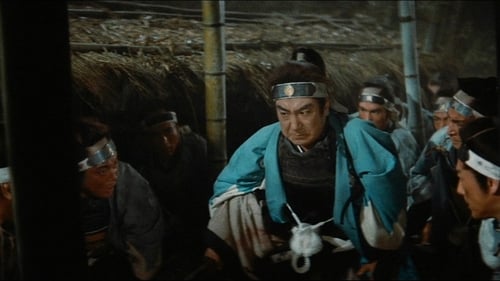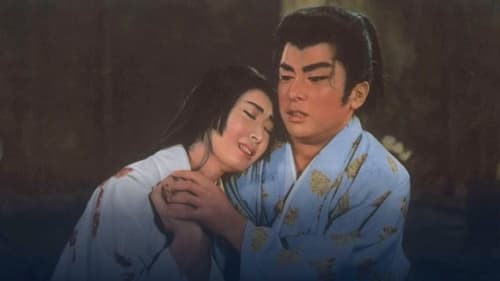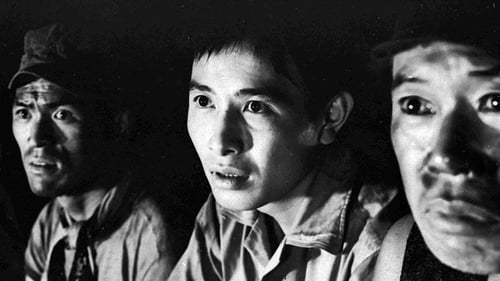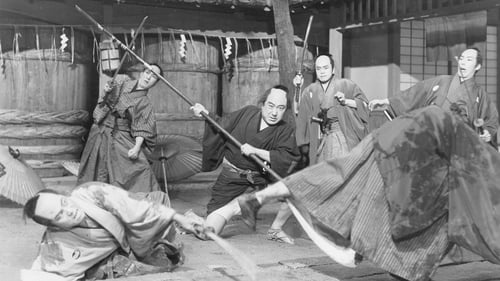
Megastar Kataoka Chiezo is Vice-commander Hijikata Toshizo of the Shinsengumi in this realistic tale of Japan’s inner battles that led to the downfall of the Tokugawa shogunate. Excellent performances and extremely good swordplay highlight this glimpse into the heart and soul of Japanese history. Although known as “Razor Blade” Hijikata, the vice-commander is a man of deep conviction with a little-known sense of humanity. Starting after the famed Ikedaya Incident, in which they saved Kyoto from Choshu’s plot to burn the city to ashes, they work hard to change the public’s view of them as merciless killers to their true mission of protecting the shogun. This is an extraordinary tale of blood and guts! From the pen of award winning author Shotaro Ikenami (Bandit Vs. Samurai, Hunter in the Dark, Misumi's The Last Samurai)

Friendship between good samurais and aborigines in Hokkaido.

In this first episode, we are introduced to Takezo, what Musashi used to be before he became the man of legend. His beginning are not exactly auspicious. He sides with the Toyotomi at Sekigahara, and as a result finds himself on the losing side of the historic battle. He and his friend Matahachi manage to escape the slaughter although the latter is wounded in his leg. They stumble across the young Akemi who makes her living with her mother Oko by robbing corpses of their armor and anything else they can sell. Oko takes it into her head to seduce Matahachi, which she does first by skillfully sucking the gangrene from his blood, and then just by sucking.

大川橋蔵主演、名匠・加藤泰監督が、シェークスピアの『ハムレット』を翻案し、瀬戸内海をのぞむ王見城の若君が、父を謀殺し城主となった叔父への復しゅうを誓う時代劇。
瀬戸内海をのぞむ王見城の若君・王見正人。留学先の明から帰国した彼を待ち受けたのは父・勝正の急死だった。叔父の師景が正人の母・時子を妻にして城主となり、悪政によって民を苦しめていることを知った正人は、乱心を装って皆の目を欺き、父の死の真相が師景の謀略であることを追及、敵を討とうとするが…。大川橋蔵主演、名匠・加藤泰監督が、シェークスピアの『ハムレット』を翻案映画化した、スペクタクル時代劇。

Master swordsman, Tsukue Ryunosuke is confronted by the families of his victims. Will justice be served for the lost innocent lives? The conclusion of the famed Jidaigeki series is an amazing film, with a completely different perspective on the story from the later versions. While the international audience is more familiar with the “Sword of Doom” and “Satan’s Sword” versions of Daibosatsu Toge (The Great Bodhisattva Pass), the “Souls in the Moonlight” trilogy casts an entirely different light on Ryunosuke and his motives. Can this brutal killer be brought to justice, or is living his life as a blind wanderer a more terrible fate? His sword skills have not diminished, nor has his desire to kill!

This is the story of Gonpachi, a ronin who falls in love with the daughter of a man he had killed many years before.

Yohei
This is the second installment of the trilogy based on Japan’s greatest novel “The Great Bodhisattva Pass”, following the life and times of bloodthirsty samurai, Tsukue Ryunosuke. Blinded in an explosion and further injured from a fall, the master swordsman is taken in by Otoyo, a woman who falls in love with him. Under Otoyo’s dedicated care, Ryunosuke’s physical and emotional wounds seem to heal. However, deep inside, the demons that drive him to kill yearn to resurface. Meanwhile he is being pursued by Utsugi Hyoma, a young samurai seeking to avenge his brother’s death at Tsukue’s hands. Hyoma is being aided along the way by the clever thief Shichibei.

Noda
Based on a 1956 television feature on Japan’s national network, NHK, this is one of Uchida’s rarest films. A socially conscious drama with a contemporary backdrop, Dotanba focuses on the attempts to rescue a group of trapped miners. The title is a figure of speech — (essentially “last minute” or “eleventh hour”) — that refers to a situation of peril. The film boasts a script co-written by Uchida and Akira Kurosawa’s frequent screenwriter, Shinobu Hashimoto, and stars Kurosawa’s frequent star Takashi Shimura.

This most celebrated all-star movie version of the popular series features Tsukigata Ryunosuke as Mito Komon, the sage who wanders the countryside rectifying government corruption along with his faithful attendants Suke and Kaku.

Genji Kurô is a master swordsman and entrusted with protecting the ancient sword Kaen by the Otsubo family.

This adaptation of a Hideji Hojo novel, about the historical uprising of the Kuroda clan in 1633, is told through the eyes of retainer, Daizen. As his clan’s new leader, Tadayuki, becomes increasingly militant in his opposition to the Tokugawa shogunate, Daizen is forced to reconcile his loyalty to the clan with his loyalty to Tadayuki, who seems dead set on entangling the clan in destructive conflict. The Kuroda Affair’s mise-en-scène is said to have influenced future Toei director Eiichi Kudo. The film also features two of the greatest stars of Japanese period cinema, Chiezo Kataoka and Ryutaro Otomo.

酒のいさかいから主人を殺された槍(やり)持ち権八のあだ討ちを、旅芸人母子、小間物屋、大金を持った男と大泥棒など、東海道を旅するさまざまな人々の人生の縮図を通して描く傑作時代劇。 仲間稼業の権八は東海道を、若様酒匂小十郎の槍持ちをつとめて、供の源太と江戸へ向った。同じ道を旅する一行は、小間物商人の伝次、身売りにゆく田舎娘おたねと老爺の与茂作、あんまの藪の市、巡礼、旅芸人のおすみ母子、挙動不審の藤三郎という男、最後に権八の槍に見とれた浮浪児の次郎等である。折柄、街道には大泥棒風の六右衛門詮議の触れ書が廻っているが、権八はそれ所ではない。朗らかで気立てが優しいが、酒乱癖のある若様を守って旅を終るのが主命である。供の源太が酒好きなので気が気ではない。一行は袋井に一宿したが、藤三郎が大金を持っているのに目をつけた伝次は、さては大泥棒とつけ廻すが、隣室で藪の市に肩を揉ませている巡礼こそ大泥棒六右衛門なのである。その夜、おすみの使を受けて権八も悪い気がせず外へ出ると、その隙に小十郎は源太を連れて酒を飲み始めたが、駈けつけた権八に制せられ事なきを得た。また旅が始まったが、大井川の近くで何処かの馬鹿殿様が始めた野立ての為通行止になり、大井川を前に長逗留となった。隙を狙って六右衛門は馬鹿殿の路銀を盗んだが、うっかりして顔を見知られた次郎に発見され、来合わせた権八の槍に怖気が出て簡単に縛についた。与茂作が女衒久兵衛におたねを渡して帰ろうとすると藤三郎に引留められた。五年前預けた娘を引取る為、稼ぎ貯めた金を持って来たのだが、娘は亡くなっていたのだ。小十郎は、素朴な人々を見て武士の世界に嫌気がさし、又源太と居酒屋に入った。権八の駈けつけた時は遅く、小十郎と源太は酔いどれ武士の手に無惨な最期を遂げていた。数日後、骨箱を抱えて国元へ出立する権八がいた。

The second film in the 1953 trilogy based on the long novel series The Great Bodhisattva Pass.










